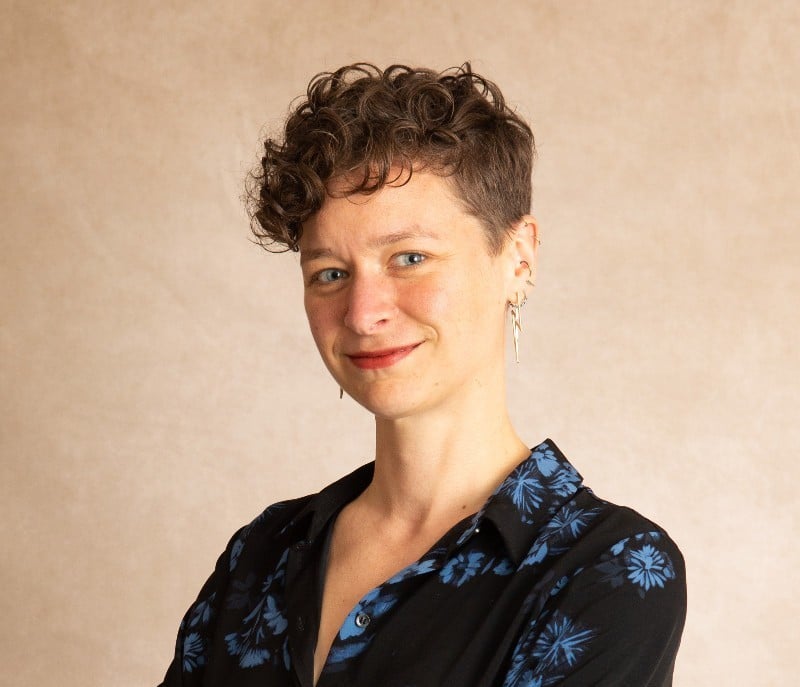The Astrophysicist Restoring Ecosystems to Combat Climate Change
Meet Claire Burke, the head of applied science at a land regeneration startup.

When Claire Burke decided to study physics, she knew it could open many doors. "You can do almost anything with a physics degree," Burke recalls hearing. But even Burke didn't expect that her Ph.D. in astrophysics would lead her to her work today: land regeneration.
"What Zulu Ecosystems sells is restored landscapes," Burke says. "So, they actually restore ecosystems." The firm works with landowners to restore degraded land, including corporate entities who often invest in carbon sequestration by buying carbon credits.
As the head of applied science at Zulu Ecosystems, a U.K.-based startup, Burke leads a team that crisscrosses disciplines. Through her astrophysics training and the roles she has held since earning her Ph.D., she has gained expertise in remote sensing, data science, machine learning, climate science, and science communication.
At the start of the land restoration process, "You look at a piece of land and kind of say, 'What does this land want to be? And what is it now?" Burke says. A plot that's currently used for farming might have soil, water, or ecological traits indicative of wetland, for example.
The science behind the work spans physics, biology, ecology, and beyond. That suits Burke, whose career has been diverse. "I've never really known what I wanted to be when I grew up," she says.
Burke’s career began in astrophysics, where she studied galaxy clusters. But during her first postdoctoral work in the field, she became “a little bit frustrated” with academia, she says. She credits her mother for planting the seed of an idea that would shape her future: "Maybe I didn't have to do astrophysics for my entire career.”
She looked further afield. After learning that "the meat industry produces more carbon than the transportation sector," which wasn't common knowledge at the time, she sought a way to make an impact. She became a climate scientist for the Met Office, the United Kingdom's national weather and climate service. "Everything on the job description was the same stuff I did in astrophysics, but looking down instead of looking up," Burke says. In that role, she studied the relationship between extreme rainfall and climate change.
Later, she spotted a unique opportunity for a second postdoc at Liverpool John Moores University in the U.K., where she had earned her doctorate. There, an astrophysicist and a conservation ecologist had started a research team called, appropriately, Astro-Ecology, which aimed to borrow imaging techniques from astronomy to support conservation efforts. With Burke on board, the team designed drones outfitted with thermal-infrared cameras to monitor wildlife, and then developed AI-based software capable of determining an animal’s species from its thermal data.
The team used their equipment in Borneo to spot wild orangutans — no small feat. “The physics says that we should be able to see the orangutans," she recalls thinking, but since orangutans live in dense, humid rainforest, that meant "trying to detect heat somewhere that's already quite hot.”
Nevertheless, they succeeded in correctly finding and identifying the orangutans, making the project a “strong proof of concept," she says.
When her postdoc ended, Burke considered continuing her career at a university, but she faced a challenge. "The academic world is very siloed — you're a biologist or you're a geographer or you're a physicist,” she says. “I was sitting in between all these different disciplines.” So, for the next few years, she deepened her experience at a handful of private-sector companies with missions rooted in climate and environmental science before landing at Zulu Ecosystems.
In her role today, "I have to be able to see where the business is going next," Burke says. She leads an interdisciplinary team, figuring out promising and potentially profitable pursuits and assessing her team’s capacity to execute them. When needed, she recruits additional researchers with complementary expertise, either hiring team members or developing new partnerships with university faculty.
After an initial project stage where the team evaluates the types of ecosystems best suited for a particular plot of land, Burke and her colleagues present a client with different options for land restoration, including the costs and potential benefits — each backed by rigorous scientific analysis. The company’s software platform enables clients to explore these detailed options, helping them “make decisions and choices about what sort of things [they] want to do with a piece of land," she says. Once a project is scoped and solidified, the firm carries out the restoration work from beginning to end.
What advice does Burke have for a physicist wanting to pursue a new career direction? "Do the things that interest you and excite you,” Burke says. “There are places you can apply your skills that you'd be surprised by."
For early-career researchers looking to transition from academia to industry, Burke suggests highlighting in your resume and interviews "your skills, rather than the papers you have written.” Those technical manuscripts from grad school? "An employer will not have a clue,” she says.
But the skills are transferable. "Can you program? Can you solve problems? Can you communicate a complicated subject to a non-technical audience?" she asks. Those are important to many employers.
With some hard work, a rewarding career in industry could be around the corner, as Burke has learned firsthand. "I talk to a lot of people," she says. "I get to think some very big thoughts about how we can solve unsolvable problems."